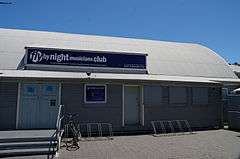Fly by Night Club
| Fly by Night Musicians Club | |
|---|---|
 | |
| Former names | Fremantle Drill Hall |
| Alternative names | Fly by Night Musicians Club |
| General information | |
| Address | 1 Holdsworth Street |
| Town or city | Fremantle, Western Australia |
| Country | Australia |
| Coordinates | 32°03′17″S 115°45′04″E / 32.05467°S 115.75105°E |
| Current tenants | Fly By Night Musicians Club |
| Construction started | 1895 |
| Completed | 1896 |
| Landlord | National Trust of Australia (WA) |
| Website | |
| http://www.flybynight.org/ | |
The Fly By Night Musicians Club, in Fremantle, Western Australia, was established in 1986 as a not-for-profit organisation by musicians and music lovers, providing live entertainment by local artists, and a modest venue for visiting national and international performers. It is housed in a heritage-listed building owned by the National Trust of Australia (W.A.), fronting Holdsworth Street and Parry Street—a prefabricated former Defence Department building, originally constructed as an artillery drill hall.
Activities
The club assists development of local musicians and performing arts, and provides a venue for other community-based activities. Capacity of its main hall is 500 patrons, mostly standing. In 1996, it was the first venue in Western Australia to bar tobacco smoking. A smaller performance space, "the Fly Trap", holds 100 patrons for local gigs, mainly by band members of the club. Other smaller spaces are available for rehearsals, workshops, seminars and community fundraising activities. Western Australian bands which have performed there or launched their careers at the club include the John Butler Trio, The Waifs, Eskimo Joe, San Cisco, The Panics and the Joe Kings. National and international performers have included Boy & Bear, Gotye, The Cat Empire, Paul Dempsey, Grizzly Bear and The Black Keys. As of 2013, it has been the regular venue of the annual WAM Song of the Year event.
Heritage building
The original building was constructed for the volunteer guard (responsible for civil defence) in 1896, and was modified in 1940, with the construction of a brick extension with a Queen Street frontage, when it was used as a training facility during World War II. The distinctive design comprises curved laminated jarrah ribs and curved iron T-sections supporting a 26-metre-span, barrel vaulted roof, constructed out of corrugated iron. It was used continuously for military purposes for almost 100 years.[1][2][3][4]
The building was classified by the National Trust of Australia (Western Australia) in April 1974 and was included on the Register of the National Estate on 21 March 1978. In September 2003, it was permanently entered by the Heritage Council of Western Australia on the State Register of Heritage Places, as part of the Fremantle Court House and Police Station Complex.[5] It is also listed on the City of Fremantle's Municipal Heritage List.[6]
References
- ↑ "Western Australia: Recruiting". The West Australian. Perth, WA. 25 February 1916. p. 7. Retrieved 27 November 2013. At Trove
- ↑ "Naval Trainees at Work.". The West Australian. Perth, WA. 11 April 1929. p. 20. Retrieved 27 November 2013. At Trove
- ↑ "Fremantle V.A.D.". The West Australian. Perth, WA. 23 July 1936. p. 6. Retrieved 27 November 2013. At Trove
- ↑ Aerial Surveys Australia (7 June 1968), Aerial photograph of the Army drill hall, Queen Street, Fremantle, retrieved 27 November 2013 At Trove
- ↑ Register of Heritage Places – Permanent Entry Heritage Council of Western Australia, 9 September 2003. Accessed 27 November 2013
- ↑ "City of Fremantle Heritage List" (pdf). City of Fremantle. Retrieved 28 December 2011.